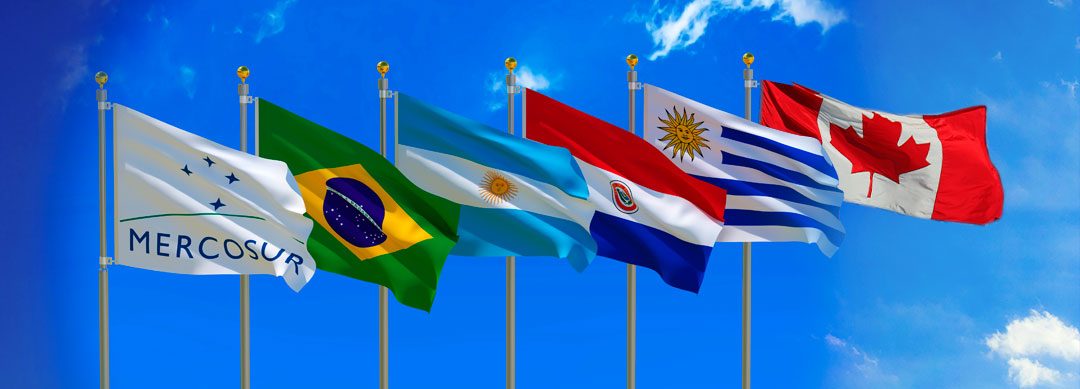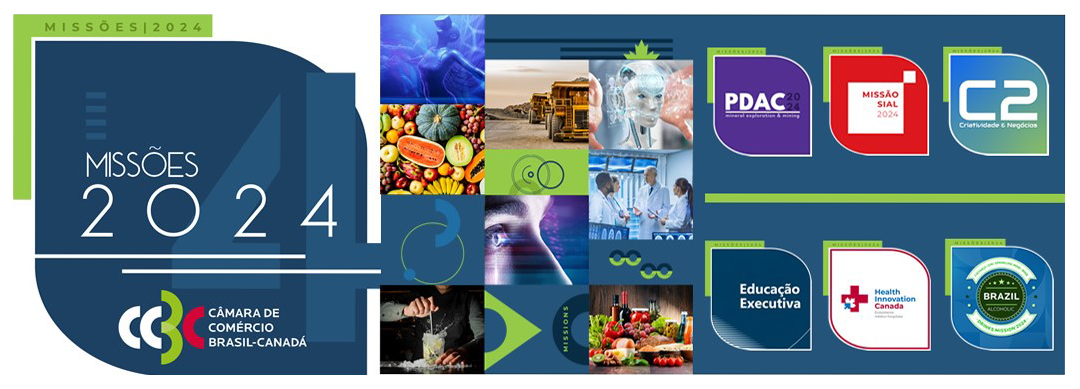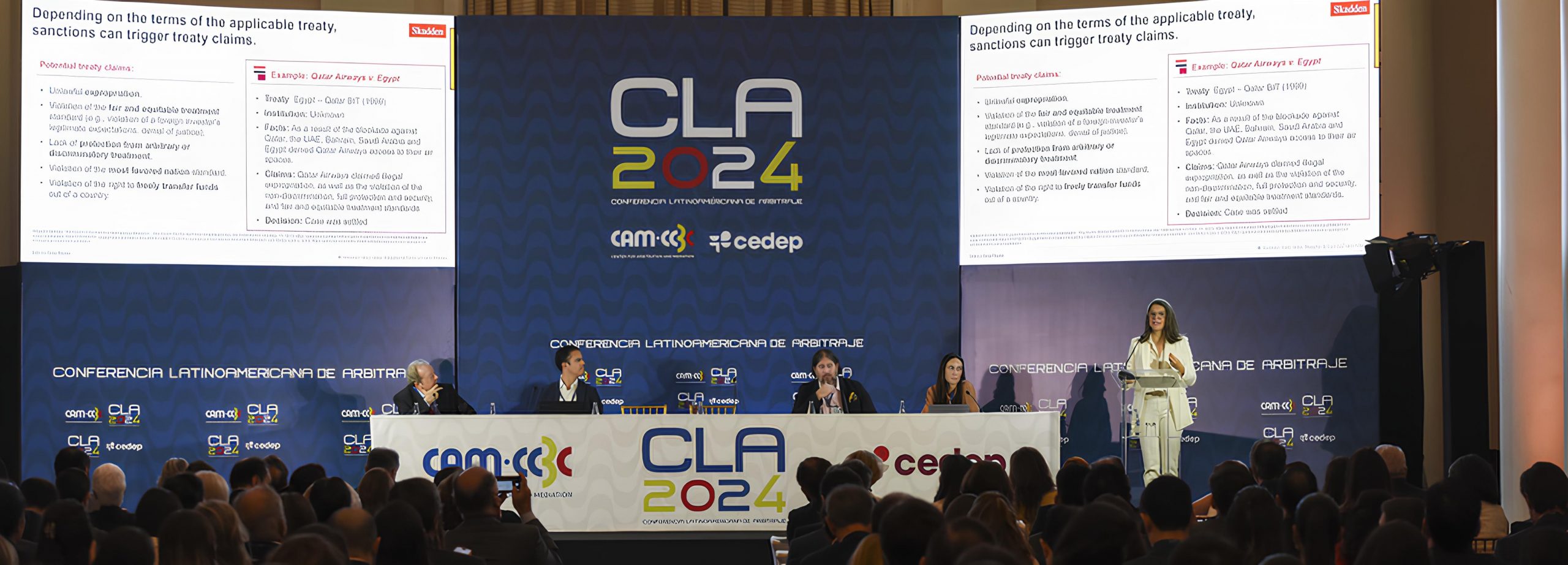Although the delays due to elections and the COVID-19 pandemic, the free trade agreement negotiations between Mercosur and Canada may be concluded by the end of 2021.
By Estela Cangerana
The free trade agreement with Canada should be an important milestone for Mercosur relations, not only because of the economic relevance of the market, but also because of the evolution in the terms and disciplines negotiated. It will be a bold, modern and inclusive agreement that will raise the level for future discussions as well, with benefits for all parties involved. This is the opinion of both Brazilian and Argentine parties, the two largest economies in the South American bloc. Representatives of both countries, who recently participated in a webinar on the topic, believe that the treaty may be concluded between the end of 2021 and the beginning of 2022.
“Our foreign trade policy received new dynamism from 2017, when we were able to resume talks with the Canadian government, with a new agenda. We deal with disciplines that we did not talk about before, like inclusive trade, indigenous trade, environment. We have gained a lot of experience with these topics and with lessons learned from Canada’s expertise in treaties such as the CTPP (Broad Trans-Pacific Partnership), which are the state of the art in trade agreements. This undoubtedly adds value for future negotiations”, said Minister Paula Barboza, head of the General Coordination for Extra-Regional Trade Negotiations at the Brazilian Ministry of Foreign Affairs (MRE).
According to the minister, despite the pace of the process being affected by elections in some of the countries involved and the COVID-19 pandemic, the talks are evolving well. “There is high complementarity between our economies, with good opportunities for everyone. Of the 27 technical groups, we have six concluded and 21 chapters to be negotiated. We are evaluating the orders placed in the last exchange of offers, in October 2019, and we already have four negotiating groups with meetings scheduled for this second semester. I believe that within a year or a year and a half we can close negotiations”, she added.
The national director of International Economic Negotiations at the Argentine Ministry of Foreign Affairs, José María Arbilla, shares the same opinion. “We have been moving relatively quickly compared to other negotiations. We want an ambitious agreement, with a different format and we face many challenges. But the work environment has been friendly and collaborative. Negotiations flow easily, which makes us optimistic”, he said. “Sensitivities are low and this is difficult to find. We have synergy”, he added.
Opportunities from agribusiness to industry
With the execution of the agreement, the prospects for increasing business are significant. Only for Brazilian agricultural exports, the increase in transactions should be US$ 8 billion, after tariffs reductions. But there are also good opportunities for the industrialized sector and public procurement.
“Canada has aroused the interest of Brazilian industry since the beginning of the talks. The country is the 8th largest importer in the world, the 6th largest international investor and has one of the five largest government procurement markets, with US$ 250 billion”, recalled the manager of International Negotiations at the National Confederation of Industry (CNI), Fabrizio Sardelli Panzini.
In 2019, total Canadian imports of products and services totalled about US$ 535 billion. However, despite Brazil’s exports to last year reaching the highest revenue since 1997, with US$ 3.4 billion, they are still below their potential. Canada was only the ninth destination for Brazilian foreign sales in the period and bilateral trade totalled US$ 5.6 billion.
“Unfortunately, we have a concentrated agenda, but there are important tariff peaks that may have gains or be withdrawn,” said Panzini, highlighting a survey that shows opportunities for the export of 336 groups of Brazilian products. About a third of them are charged by Canada, according to studies by Fundação Centro de Estudos de Comércio Exterior (Funcex). There are machines and equipment, chemicals, food and metallurgy, among others.
Multiple gains
“Increased trade with Canada will be good for the agro sector and for our industry as well. We can have an easier win-win. And with Canada there is still a very large possibility of investments”, explained Professor Roland Saldanha, chief economist at Sidera Consult, a consultancy specialized in international trade.
For Saldanha, as well as for the director of International Trade of Argentine Quipu Advisors, Federico Lavopa, the special attention given to regulatory aspects in negotiation is also positive. “These issues are important and must be clear in mining, for example,” said Lavopa. The sector is one of the most relevant in Argentina’s relationship with Canada. About 80% of Argentine sales there are gold, which, in turn, corresponds to 40% of all gold sold abroad by the country.
In the opinion of experts, the Mercosur-Canada agreement would help both Brazil and Argentina not only in increasing the transactions of groups of products already commercialized and in diversifying the list, but also in reducing inequalities. Canada already has treaties with other major world players in the agro sector, for example, which generates advantages for these countries in sales.
“We look not only at the rules that will be established but also at their implementation, with the rational use of mechanisms to avoid distortions”, highlighted the legal director of International Trade at the Techint Group and lecturer at the Argentine Industrial Union (UIA), Pablo Strada. For him, the path for this to happen and the agreement to have the best possible result is through the approximation between the public and private sectors and the joint work of entities such as the Chambers of Commerce of the countries involved, such as Brazil and Argentina.
The statements by Ministers Paula Barboza and José María Arbilla and experts Fabrizio Panzini, Roland Saldanha, Federico Lavopa and Pablo Strada were given precisely in the Mercosur-Canada webinar: Opportunities for Brazil and Argentina, as a result of the partnership between CCBC and the Chamber of Commerce Argentina-Canada (CCAC). The event was moderated by the CCBC Institutional Relations director, Paulo de Castro Reis, and the leader of the CCAC Foreign Trade Group, Augusto Vechio.
To learn more:
Watch the complete Mercosur-Canada webinar: Opportunities for Brazil and Argentina





